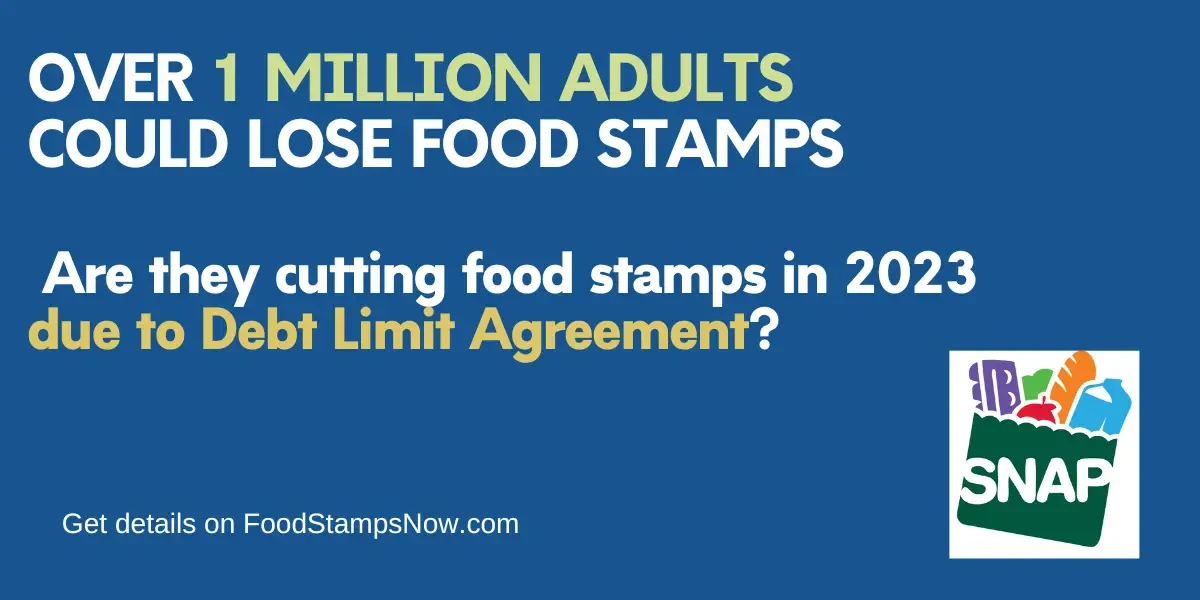Over 1 million adults could lose food stamps if the debt ceiling agreement between the Speaker of the House and President Biden is approved by Congress. This blog post delves into the potential consequences of these proposed cuts and sheds light on the challenges faced by families across the nation who could lose SNAP benefits.

Over 1 Million Adults Could Lose Food Stamps
In the wake of the COVID-19 pandemic, millions of American households relied on Supplemental Nutrition Assistance Program (SNAP) benefits to put food on their tables.
However, with the expiration of pandemic-related assistance, many families are already struggling to afford enough food.
The situation may worsen due to proposed spending cuts in the debt limit negotiations, which could leave over 1 million adults without food stamps.
The Impact of Expired Benefits
During the pandemic, emergency legislation allowed SNAP participants to receive maximum monthly benefits, regardless of income.
This assistance provided a lifeline to families like Ruth Rodriquez’s in Camden, New Jersey, ensuring that they had enough to eat.
However, after the expiration of the additional benefits earlier this year, households are facing a significant decrease in monthly assistance.
As a result, individuals like Rodriquez are struggling to put food on their tables, leading to increased food insecurity.
Proposed GOP Cuts and the Risk to SNAP Benefits
In the midst of the debt ceiling standoff, House Speaker Kevin McCarthy and House Republicans have put forth a plan that includes spending cuts, potentially impacting federal food assistance programs like SNAP.
McCarthy’s plan suggests raising the age limit for work requirements for “able-bodied individuals” without dependents from 50 to 56.
The Center on Budget and Policy Priorities estimates that this change could affect nearly 1 million Americans aged 50 to 55.
The proposed cuts have the potential to impact SNAP recipients in various states across the country.
Here are some examples of the number of individuals aged 50 to 55 participating in SNAP who could be at risk of losing their benefits under the proposed plan:
- Alabama: 17,000
- California: 136,000
- Florida: 58,000
- New York: 54,000
- Texas: 53,000
- Ohio: 39,000
- Pennsylvania: 40,000
These figures demonstrate the significant number of individuals in various states who may face the loss of food stamp benefits if the proposed GOP cuts are implemented.
House Progressive Caucus Chair Rep. Pramila Jayapal says it is ‘really unfortunate’ Biden allowed changes to food stamps in debt limit dealhttps://t.co/UdrZIIJJBo
— The Washington Times (@WashTimes) May 29, 2023
Struggles of Families Post-Pandemic
The expiration of pandemic-era supplemental benefits has left many families struggling to afford enough food.
A survey conducted by ParentsTogether Action, a nonprofit advocacy group, revealed that 63% of parents found it hard to make ends meet, and 68% identified having food on the table as their biggest challenge.
Furthermore, 44% of parents reported being unable to afford sufficient food for their households, and 37% admitted to skipping meals to feed their children.
These struggles are not limited to specific states but are prevalent nationwide.
Families in 32 states lost their increased pandemic SNAP funds in March, adding to the challenges they already face.
The impact of the proposed GOP cuts to SNAP would further exacerbate the difficulties experienced by families across the country.
The Debate Surrounding Work Requirements
House Republicans advocating for work requirements argue that such mandates can lift people out of poverty and reduce reliance on government assistance.
However, critics argue that work requirements can shrink safety net programs without considering the potential negative impact on those left struggling to meet their basic needs.
Studies have shown that SNAP’s existing work requirements do not significantly improve employment or earnings.
The proposed expansion of work requirements under the GOP plan raises concerns about leaving vulnerable individuals without food assistance.
What it means – Over 1 Million Adults Could Lose Food Stamps
The potential loss of food stamps for over 1 million adults raises serious concerns about food insecurity in the United States.
The expiration of pandemic-era benefits has already placed a significant burden on families, and proposed GOP cuts to SNAP could exacerbate the situation.
It is crucial to recognize the challenges faced by individuals like Ruth Rodriquez and the millions of families struggling to put food on their tables.
As policymakers debate the future of food assistance programs, it is essential to consider the specific impact .
Individuals in different states, such as the thousands of participants in Alabama, California, Florida, New York, Texas, Ohio, and Pennsylvania who may lose their SNAP benefits.
Ensuring access to nutritious food should be a priority, regardless of where individuals reside, as food insecurity knows no state boundaries.
It is imperative to protect the well-being and security of vulnerable populations and provide the necessary support to alleviate the hardships faced by families nationwide.
Over 1 Million Adults Could Lose Food Stamps Summary
We hope this article on “Over 1 Million Adults Could Lose Food Stamps” was helpful to you.
If you have any additional questions about Summer P-EBT, including how to apply or payment schedule, please let us know in the comments section below.
In the meantime, be sure to check out our other articles on SNAP, EBT and Food Stamps:
- 38 States Approved for 2023 Summer P-EBT
- Extra Food Stamps for July 2023
- Food Stamps Income Limits for 2023
- EBT Card Discounts by State (2023)
- Discounted Amazon Prime for EBT Cardholders
- How to get $10 Internet with Food Stamps
- Stores that accept EBT Online for delivery
- How to get a Free 5G Government Phone
